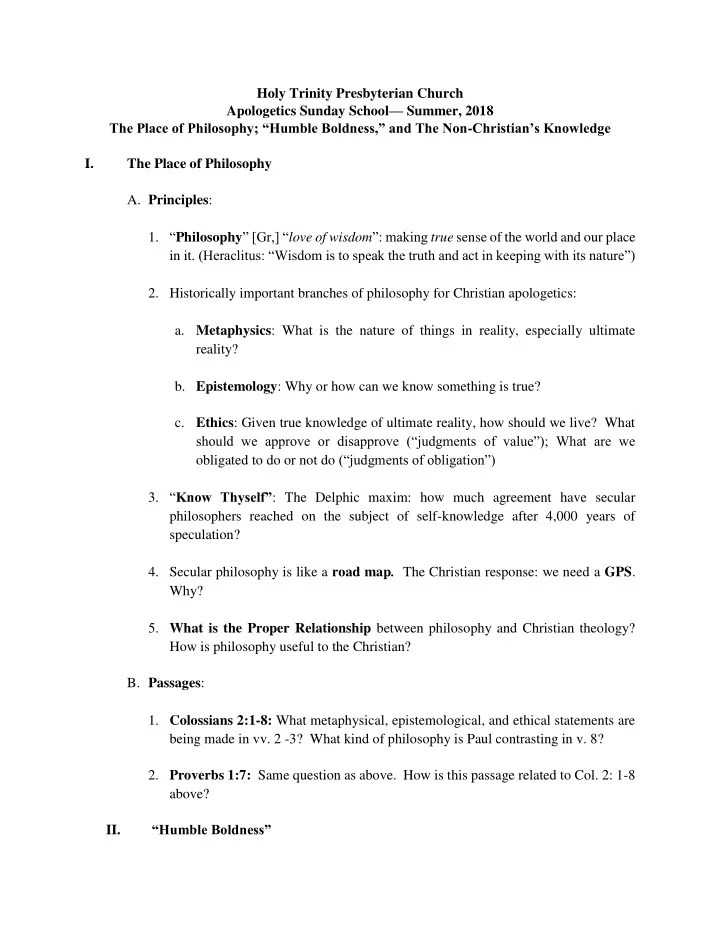

Holy Trinity Presbyterian Church Apologetics Sunday School — Summer, 2018 The Place of Philosophy; “Humble Boldness,” and The Non - Christian’s Knowledge I. The Place of Philosophy A. Principles : 1. “ Philosophy ” [Gr,] “ love of wisdom ”: making true sense of the world and our place in it. (Heraclitus: “Wisdom is to speak the truth and act in keeping with its nature”) 2. Historically important branches of philosophy for Christian apologetics: a. Metaphysics : What is the nature of things in reality, especially ultimate reality? b. Epistemology : Why or how can we know something is true? c. Ethics : Given true knowledge of ultimate reality, how should we live? What should we approve or disapprove (“judgments of value”); What are we obligated to do or not do (“judgments of obligation”) 3. “ Know Thyself” : The Delphic maxim: how much agreement have secular philosophers reached on the subject of self-knowledge after 4,000 years of speculation? 4. Secular philosophy is like a road map . The Christian response: we need a GPS . Why? 5. What is the Proper Relationship between philosophy and Christian theology? How is philosophy useful to the Christian? B. Passages : 1. Colossians 2:1-8: What metaphysical, epistemological, and ethical statements are being made in vv. 2 -3? What kind of philosophy is Paul contrasting in v. 8? 2. Proverbs 1:7: Same question as above. How is this passage related to Col. 2: 1-8 above? “Humble Boldness” II.
A. Principles: 1. First critique of a Christian theistic apologetic approach: “it’s arrogant and prideful.” Why so? 2. The Christian theistic apologetic response: it’s actually arrogant and prideful not to believe in God or submit to him. Why? What should be our attitude as we make such claims? a. Boldness in challenging unbelief and compromised epistemologies is essential for Christians. Prov. 15:32; Acts 17:30 b. Humility in recognizing that any wisdom we have as Christians is not inherently our own but rests upon the undeserved grace of God, received as a gift. Prov. 15:33; Eph. 2:8-9 B. Passage : Acts 17:22- 34. What aspects of this passage demonstrate Paul’s “humble boldn ess.” The Non- Christian’s Knowledge III. A. Principle : Although a non- Christian denies God’s authority over all of metaphysics, epistemology, and ethics, some level of knowledge-in-common is possible (and essential for life in the world). 1. The non-Christian in art, literature, science and mathematics. 2+2 still equals 4. Is this “true knowledge” ? 2. Presuppositions : Belief commitments upon which we base decisions and actions. Example: a teenager bouncing a basketball: what metaphysical, epistemological and ethical presuppositions are in effect? 3. Religious presuppositions : belief commitments about God , which affect our view of ultimate reality, knowledge, and ethics, and direct future decisions and actions. 4. Suppression : The non-Christian: a. Presupposes that God does not exist;
b. Can agree with Christians on certain propositions (2+2=4, for example) on a limited basis; and c. Actually has some knowledge of God and His authority (through the witness of creation and conscience, if not Scripture), but suppresses the knowledge of this truth (including the knowledge that God is the source of all true reality, knowledge, and ethics). 5. As a matter of God’s common grace upon the creation , He “suppresses the suppression” so that men and women can still function in the world. 6. The non- Christian therefore “borrows knowledge ” from God . The non- Christian is indebted to God for the intelligibility of all things, but will not recognize or acknowledge God as source. B. Passages : 1. Romans 1:18-32, 18-20: Does Paul assert that humans might know there is some god or another? How does the non-Christian know and not know God at the same time? 2. Romans: 2:14-15 : How does thi s passage illustrate God’s suppression of the non - Christian’s suppression of knowledge?
Recommend
More recommend